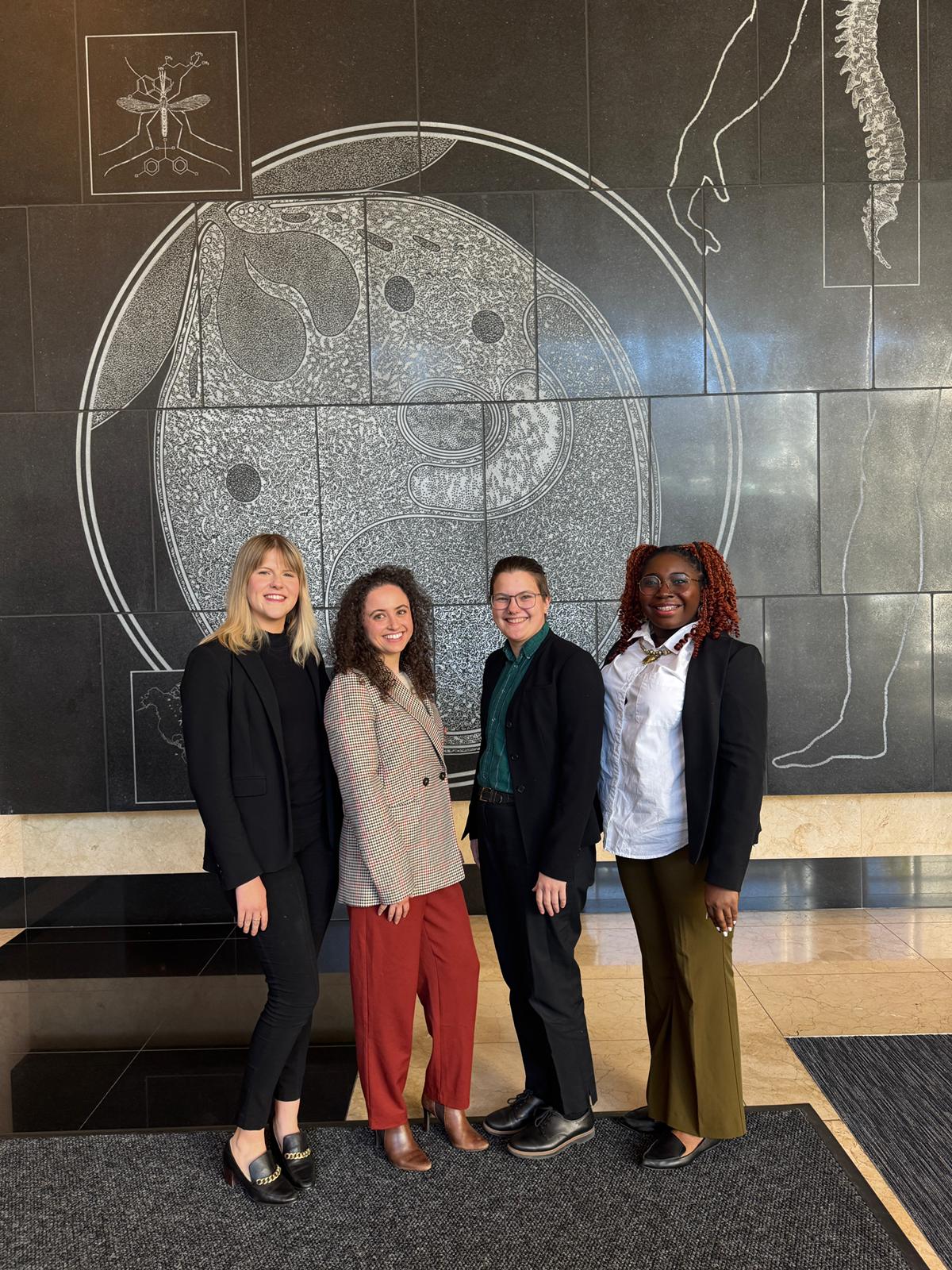UMB Interprofessional Team Wins Grand Prize in D.C. Public Health Case Challenge
December 04, 2024 Jen Badie
The project by students from the School of Medicine, Maryland Carey Law, and School of Social Work addresses mental health and substance use in the community college population.
Photo: Left to right, UMB’s team of Erika Shook of the School of Medicine, Amanda Saikali of Maryland Carey Law, Alex Boldin of the School of Social Work, and JaNýa Darionna Brown of the School of Medicine won the Grand Prize in the D.C. Public Health Case Challenge.
An interprofessional team from the University of Maryland, Baltimore (UMB) won the 2024 Grand Prize in the D.C. Public Health Case Challenge this fall with its project to address mental health and substance use in the community college population.
The National Academy of Medicine’s challenge focused on developing a broad-based, population-level approach to respond to the mental health needs of adults ages 18 to 29 in the Washington, D.C., area. Seven teams from nearby universities competed — each with up to six members from at least three disciplines — and were given about two weeks to develop a solution with a hypothetical $1.5 million budget to be used during a three-year span. The teams presented their solutions to a panel of expert judges who evaluated the interdisciplinary nature of the proposals, feasibility of implementation, creativity, and practicality.
Students Alex Boldin of the University of Maryland School of Social Work (UMSSW); JaNýa Darionna Brown of the University of Maryland School of Medicine (UMSOM); Amanda Saikali of the University of Maryland Francis King Carey School of Law; and Erika Shook of UMSOM delivered the winning project called “Guiding Resilience and Offering Wellness (GROW).”
UMB’s plan has three prongs: a wellness leadership workshop and certification program; a case-management team; and an interactive screening program to increase student engagement, mitigate loneliness, and support long-term mental health and wellness. The program’s aims include increasing health insurance coverage and access to mental health treatment providers for community college students in the Washington area, increasing their mental health literacy, and reducing their experiences of loneliness and isolation.
It was the first time a UMB team had won the Grand Prize since 2019. UMB’s teams in 2022 and 2023 were awarded a Wildcard Prize.
Shook, who is a UMSSW staff member pursuing a Master of Public Health degree, said UMB’s project was successful because the team clearly defined its audience, understood its needs and challenges, and developed an intervention that holistically addressed the needs of mental health and substance use.
“We really emphasized the importance of primary, secondary, and tertiary prevention, and implemented strategies that could target the health problem from an upstream approach,” she said.
UMB’s team was advised by Gregory B. Carey, PhD, associate professor, Department of Microbiology and Immunology, executive director of student research and community outreach, and assistant dean for student research and education, UMSOM; and Rebecca Hall, JD ’13, managing director, Law and Health Care Program, Maryland Carey Law. Maryland Carey Law students and previous competitors Byron Cheung and Sara Devaraj also advised the team.
Carey said the team gelled quickly.
“The project spoke to the students’ passion to address a topic that was personally important, relevant, and timely to them — mental health challenges and resource access in young people,” he said. “The authenticity was palpable as one student was open and related their own mental health struggles during college. The scholars are all supremely talented and creative, and from the time of being interviewed for the team, they expressed a genuine need and passion to contribute to the common good. This project, as some might say, had their names written all over it.”
The team members mapped their skills and experiences and assigned chunks of the tasks per their strengths, according to Carey.
“They conducted ideation sessions and research, discussion and synthesis, and plans and operated on a strict schedule,” he said. “They knew they had to sell and market the idea and defend its feasibility in the competition. They understood and embraced the pressure and intense schedule layered into or on top of their busy work and study schedules.”
Shook said despite the pressure, she was pleased that she participated in the challenge.
“It was very stressful balancing classes, jobs, personal lives, and now finding time to work on the case challenge. It made it all worth it, though,” she said. “It really showed how our different strengths and knowledge could come together to create a well-researched intervention that addressed the case.”
Shook, who was chosen to be the team’s project liaison and was responsible for the communications and final submission to the National Academy of Medicine, said the project was the first time she worked with an interdisciplinary team.
“The highlight of this experience was meeting new people from different disciplines and coming together to work on such an important health topic. It shows how complex health problems need an all-hands-on-deck approach to address the multiple levels of the issue,” she said. “I learned so much from my teammates and value the friendships we made.”
Carey recalled a moment during the team’s preparations that stood out to him.
“One seminal moment was when the students got through their dry practices and agreed that win or lose, they were going to play to win but planned to enjoy every moment and were determined to make a big and positive impact. They accomplished both,” he said.